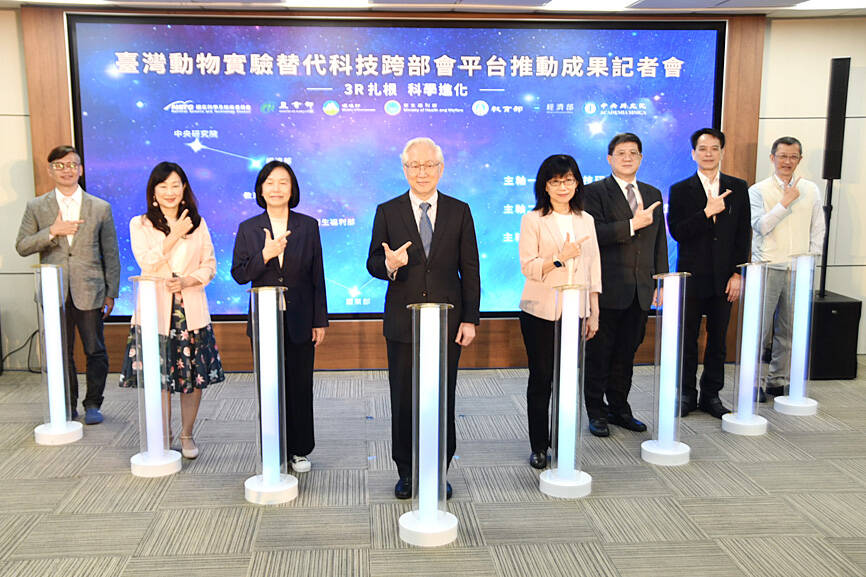Animal testing can be reduced by 60 percent on average due to alternative testing methods developed by Taiwanese researchers, National Science and Technology Council (NSTC) Minister Wu Tsung-tsong (吳政忠) said yesterday.
Animal testing is often necessary to ensure the safety of pharmaceuticals, pesticides and cosmetics before they can hit the market, but local researchers have developed 102 alternative testing methods that can reduce the need for testing on animals, Wu told a news conference held on World Day for Laboratory Animals.
“Normally, if you rely too much on animal testing then you harm animals, and if you do not test on animals, you risk producing products that are unsafe for people,” he said.

Photo: Wu Po-hsuan, Taipei Times
The situation motivated the government in October 2022 to establish an inter-ministerial platform committed to tackling the issue, he said.
“We were committed to achieving the “three Rs” of animal testing: replace, reduce and refine,” he said, adding that he felt that Taiwan had an obligation as an advanced country to move in this direction.
Seven ministries and other government agencies are participating in the platform: the NSTC, the Ministry of Agriculture, the Ministry of Environment, the Ministry of Health and Welfare, the Ministry of Education, the Ministry of Economic Affairs and Academia Sinica, he said.
Through the platform, the agencies seek to leverage Taiwan’s strengths in semiconductors, the capabilities of generative artificial intelligence, and the ministries’ knowledge and experiences in the fields of biomedicine, agriculture and animal science, he said.
In addition to protecting animals, the platform’s focus is on establishing more efficient methods for biomedical research and drug development.
The alternative-testing project is expected to be extended until 2027 and would receive annual funding of NT$200 million (US$6.15 million), NSTC Deputy Minister Chern Yi-juang (陳儀莊) said.
In one example of an alternative testing method developed under the project, a team found a way to use biomimetic skin cells to replace rabbits when testing irritants and corrosive materials, National Laboratory Animal Center Director Chin Hsien-ching (秦咸靜) said.
Alternative testing was also shown to be faster, she said, citing a four-day test cycle for assessing the toxicity and risks of pesticides.
National Cheng Kung University College of Medicine professor Wang Ying-jan (王應然) said his team of researchers has partnered with 25 companies to process research data, enabling them to avoid wasting resources and repetition during experimentation.

Eight restaurants in Taiwan yesterday secured a one-star rating from the Michelin Guide Taiwan for the first time, while three one-star restaurants from last year’s edition were promoted to two stars. Forty-three restaurants were awarded one star this year, including 34 in Taipei, five in Taichung and four in Kaohsiung. Hosu (好嶼), Chuan Ya (川雅), Sushi Kajin (鮨嘉仁), aMaze (心宴), La Vie by Thomas Buhner, Yuan Yi (元一) and Frassi in Taipei and Front House (方蒔) in Kaohsiung received a one-star rating for the first time. Hosu is known for innovative Taiwanese dishes, while Chuan Ya serves Sichuan cuisine and aMaze specializes

Taitung County is to launch charter flights to Malaysia at the end of this year, after setting up flights to Vietnam and Thailand, the Taitung County Government said yesterday. The new charter flight services, provided by low-cost carrier Batik Air Malaysia, would be part of five-day tour packages for visits to Taitung County or Malaysia. The Batik Air charter flight, with about 200 seats, would take Malaysian tourists to Taitung on Dec. 30 and then at 12:35pm return to Kuala Lumpur with Taiwanese tourists. Another charter flight would bring the Taiwanese home on Jan. 3 next year, arriving at 5:30pm, before taking the

Taiwan High Speed Rail Corp. (THSRC) plans to ease strained capacity during peak hours by introducing new fare rules restricting passengers traveling without reserved seats in 2026, company Chairman Shih Che (史哲) said Wednesday. THSRC needs to tackle its capacity issue because there have been several occasions where passengers holding tickets with reserved seats did not make it onto their train in stations packed with individuals traveling without a reserved seat, Shih told reporters in a joint interview in Taipei. Non-reserved seats allow travelers maximum flexibility, but it has led to issues relating to quality of service and safety concerns, especially during

An exhibition celebrating Taiwan and Japan’s comic culture opened on Saturday in Taichung, featuring a section that explores Taiwanese reproductions of Japanese comics from when martial law limited Japanese representation. “A Century of Manga Culture: An Encounter of Taiwan and Japan’s Youth” held its Taiwan opening ceremony at Taichung’s National Taiwan Museum of Comics after an initial one-month run in Japan’s Kyoto International Manga Museum between May 24 and June 24. Much like the Kyoto exhibition, the show mainly celebrates the comic connection between Taiwan and Japan through late Taiwanese comic book